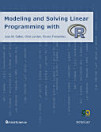Computational Ergodic Theory
dic 2005 · Algorithms and Computation in Mathematics Libro 13 · Springer Science & Business Media
eBook
453
Páginas
reportLas valoraciones y las reseñas no se verifican. Más información
Información sobre este eBook
Ergodic theory is hard to study because it is based on measure theory, which is a technically difficult subject to master for ordinary students, especially for physics majors. Many of the examples are introduced from a different perspective than in other books and theoretical ideas can be gradually absorbed while doing computer experiments. Theoretically less prepared students can appreciate the deep theorems by doing various simulations. The computer experiments are simple but they have close ties with theoretical implications. Even the researchers in the field can benefit by checking their conjectures, which might have been regarded as unrealistic to be programmed easily, against numerical output using some of the ideas in the book. One last remark: The last chapter explains the relation between entropy and data compression, which belongs to information theory and not to ergodic theory. It will help students to gain an understanding of the digital technology that has shaped the modern information society.
Valorar este eBook
Danos tu opinión.
Información sobre cómo leer
Smartphones y tablets
Instala la aplicación Google Play Libros para Android y iPad/iPhone. Se sincroniza automáticamente con tu cuenta y te permite leer contenido online o sin conexión estés donde estés.
Ordenadores portátiles y de escritorio
Puedes usar el navegador web del ordenador para escuchar audiolibros que hayas comprado en Google Play.
eReaders y otros dispositivos
Para leer en dispositivos de tinta electrónica, como los lectores de libros electrónicos de Kobo, es necesario descargar un archivo y transferirlo al dispositivo. Sigue las instrucciones detalladas del Centro de Ayuda para transferir archivos a lectores de libros electrónicos compatibles.







